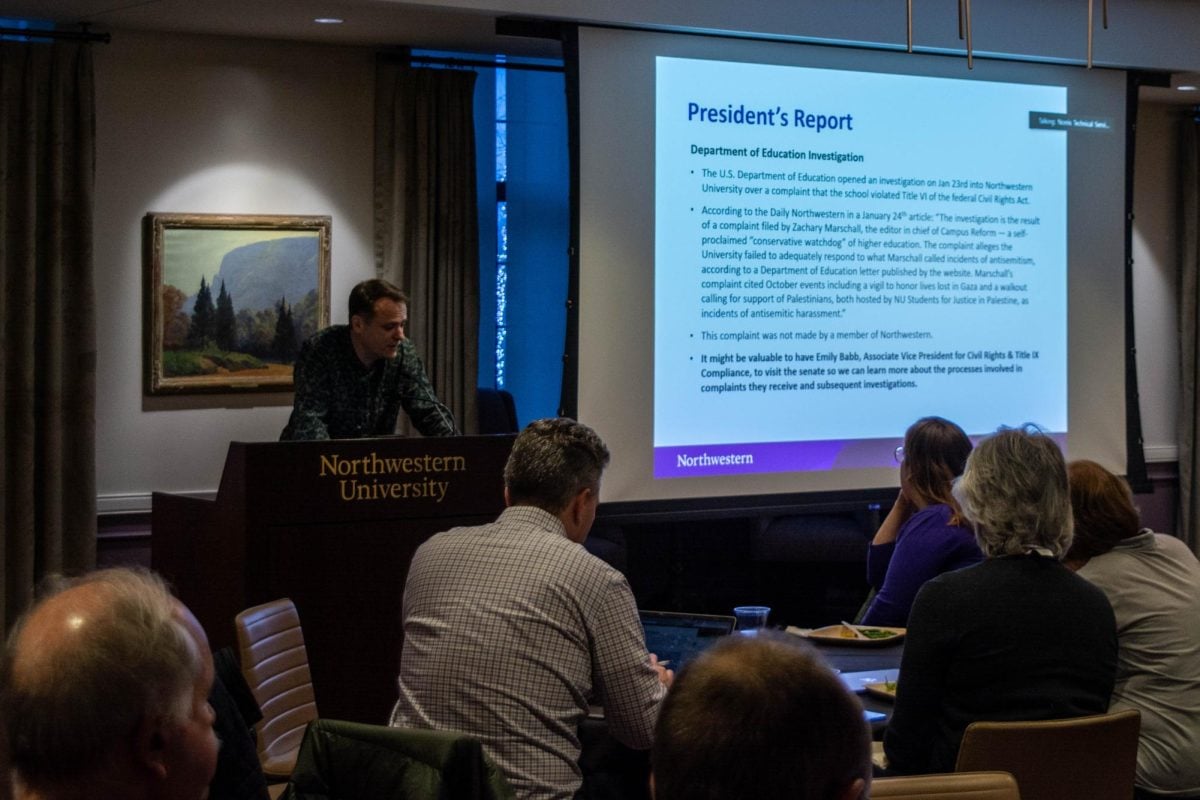The Faculty Senate heard plans to increase endowment investment returns and gave feedback on a newly revised CTEC tool — the University’s course and teacher evaluation system — at Wednesday’s meeting.
Vice President and Chief Investment Officer Amy Falls spoke about balancing risk and return in the University’s investments, as well as her plans to reestablish the Advisory Committee on Investment Responsibility.
As of last August, Northwestern’s endowment was valued at $13.7 billion. This fiscal year, the University will draw $762 million from the endowment for the budget, compared to $675 million the year before, Falls said.
“Our goal is to preserve value, not to hoard and not to deplete,” Falls said.
Falls said she believes the endowment is on track to generate an 8% annual return, which would allow the school to continue supporting future generations of students.
However, Falls also added that the performance of the University’s assets over the past five years is not meeting its benchmark because NU has been controlling risk more than Falls considers necessary.
“One of the things we have been pushing for is taking a little more risk because we do want those higher returns,” she said.
According to Falls, because of the 2008 global financial crisis, NU’s investments for the last decade have been geared toward liquidity, which leads to “average returns.”
After Falls’ presentation on the endowment, Kellogg Prof. Therese McGuire asked about re-establishing the ACIR, which is meant to advise the Board of Trustees on ethical considerations in their investment decisions.
Falls said she is hoping to nominate faculty to the advisory committee for three-year terms by this spring.
Medill lecturer and Integrated Marketing Communications Full-Time Program Director Jacqueline Babb, chair of the Senate’s Educational Affairs Committee, also presented on a revised CTEC tool for faculty input.
CTEC revisions, geared toward reducing racial and gender bias, have been in progress since 2018.
“It’s a little gnarly because each stakeholder group has different needs,” Babb said. “There’s a lot of evidence that shows women and people of color are biased against in these types of instruments.”
The newest version of the CTEC tool includes a formative statement that reminds students to avoid bias and to keep their feedback constructive, and includes three quantitative questions and one qualitative question.
“We know that students oftentimes think they learned more or less than they actually did,” Babb said, “So this is meant to look at their experience (in class).”
Members of the senate still had concerns, including the possibility that the new form might mask bias behind numbers instead of eliminating it, and many added the new CTEC tool does not address all constituencies’ issues.
“In Weinberg, faculty don’t like CTECs because the students are writing mainly to the other students,” sociology and political science Prof. James Mahoney said. “They want feedback that goes directly to them, but a lot of the CTEC feedback is ‘this is an easy class’ or ‘this class has a huge workload’ … it’s very clearly directed as advice to fellow students, rather than being directly to the professors.”
Other topics mentioned at this month’s meeting included the Department of Education’s ongoing Title VI investigation into Northwestern’s alleged failure to respond to antisemitic incidents and the University’s retirement contribution policy.
The next Faculty Senate meeting will take place on March 6.
Email: [email protected]
X: @isabelsu_
Related Stories:






